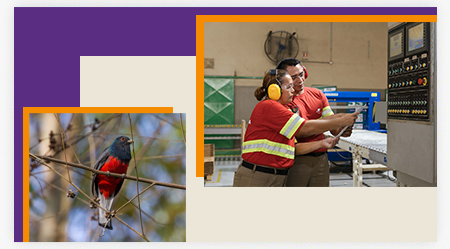Water use
Water security management
The hydrosolidarity forest management methodology focusing on territorial water security, pioneered by Klabin in the industry, aims to contribute to the protection of micro-watersheds and the water security of the communities surrounding the forestry units.
The strategy aims to achieve a balance between forest production and water production, considering the integration of different needs for the input, including neighboring communities and ecological processes.
A set of practices that enable the proper guidance of land use and other natural resources with the aim of producing environmental goods and services without affecting the soil and water.
SEE GLOSSARYWater consumption
A 20% reduction in specific water consumption by 2030, based on the year 2018, is one of the KODS targets. Specific consumption is the result of subtracting the amount of effluent treated and returned to the source from the amount of water withdrawn from the source.
The implementation of initiatives to increase territorial water security in all locations where the Company operates is also one of the targets of the Klabin 2030 Agenda. An area is internally referred to as water-stressed when it reaches rates of more than 20% of the ratio between the total amount of water withdrawn annually and the annual renewable supply available. For this control, Klabin monitors its units using the WRI Aqueduct tool, which allows prioritizing actions needed to prevent impacts in more vulnerable territories.
To detect the risks related to water dependence and consumption in water-stressed areas, Klabin prepared a report on monitoring the flow of rivers and the volume of rainfall in the regions where the plants are located, aiming to anticipate possible water shortage scenarios and identifyt alternatives. This report is monitored by the Water Management Working Group which, in addition to supporting the strategic management of this resource, helps define the actions needed to minimize impacts in these regions and identify opportunities to reduce water use at the Company.
The results obtained during the year are generally directly affected by the start-up and commissioning process of the Company's new operations. By 2024, these operations should reach stability, after having achieved the projected capacity. The continuous monitoring of water consumption in Klabin's activities will be maintained to ensure the permanence of good results. The Company reinforces its commitment to achieving the target of reducing specific water consumption by at least 20% by 2030.
97.3%
of forest harvesting operations under water security management
29.8%
reduction in specific industrial water consumption
74%
of locations with initiatives to increase water security
Effluent management
Before being returned to water bodies or directed to the municipal treatment system, 100% of Klabin's industrial process effluents are treated in Effluent Treatment Plants (ETPs) and monitored both internally, by the Company itself, and externally, by certified and accredited companies, with quality results verified by external audits.
Intergovernmental Panel on Climate Change. Created by the United Nations Environment Program (UN Environment) and the World Meteorological Organization (WMO), it aims to provide policy makers with regular scientific assessments of climate change, its implications and possible future risks, as well as propose adaptation alternatives and damage mitigation policies.
SEE GLOSSARY
98.7%
of the total water withdrawn in 2023 was used in pulp and paper production operations

The Puma Unit has the installed capacity to treat all its industrial effluents in the tertiary treatment plant, meeting the most stringent standards, such as those of the IFC
Challenges
Water resource management is a constant challenge for forestry and industrial operations, especially in regions facing water stress. Klabin has been studying methodologies to quantify the positive impacts of water resource management on the preservation of native forests and water quality in micro-watersheds.
The Company continues to face the challenge of optimizing water use, considering the planned production increases with expansion in the coming years.
As with the management of aspects related to climate change, Klabin wants to promote the engagement of various stakeholders in this area. In 2023, the main theme of the Klabin Caiubi Program, focused on environmental education, was water security, reinforcing with municipal schools in the regions where it operates the importance of preserving water resources.






